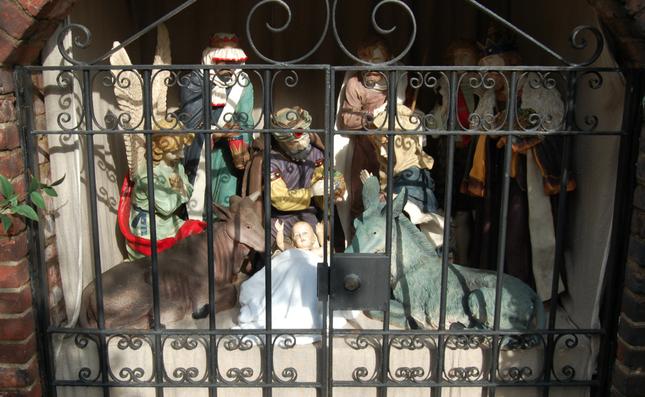In This Time, In This Season
By • January 9, 2016 0 1031

We are living in a time when certain politicians who shall remain nameless (for once) advocate closing America’s borders to members of a religion that is not Christianity. We are living in a time when radical, extreme members of that religion are advocating, encouraging, inspiring and committing killings in the name of that religion.
All of this is happening in the time in which we live, and we see it, hear it, read it on all the things that we carry in our pockets, that we set up in restaurants or in our homes. All of this is happening with increasing intensity in a season in which we celebrate the opposite of the mindsets that lead to atrocities and inflammatory rhetoric.
We are celebrating a season that notes the birth of a child, a season that embraces love and hope and a possible future that would accentuate peace and human kindness. In this time.
We should think about that birth and that event for a moment. On its face and as an event, it was a small thing, noted only, if you believe so, in prophecies and by those who happened to witness it either by choice or happenstance.
It happened in the smallest of towns in what is now Palestine, home now to still-warring factions, but home then to mostly its Jewish residents, and part of the Roman Empire, ruled by a local king who paid tribute and political obeisance to Rome, personified by its first emperor, Augustus Caesar, who would become the first emperor-god of Rome.
The baby’s name was Jesus, and his earthly parents were Mary and Joseph, the latter a carpenter. In that time, there were as yet no Christians or Muslims; as yet, no Communists or Democrats or Republicans or Americans. The world as a whole was mostly unmapped, but it contained even then multitudes of different kinds of people, most of whom were unaware of each other.
Jesus was born a Jew and would die on a cross and, in the end, by his life and actions — by noted miracles and by preaching a gospel that showered the least of us with love and compassion, by spreading hope that made suffering on earth bearable as a passing thing, that made even poverty seem blessed with dignity. He talked in parables and stories, and it was said at the time and so passed on into gospel that hundreds if not thousands were fed at one of his sermons in the countryside.
That night, he was a mewling baby, blessed nonetheless. He was as small as humans get, and as frail, and his presence would inspire fear in a king and in the rest a spirit of love and humility and kindness that we all wish for. His presence on this day remains in the hearts and minds of many who long in this time of a kind of madness for peace and understanding, for gracious thoughts and compassion that remind us that there are millions out there living in worse places than a stable.
In the town of Bethlehem, as the story has it, there was not room at the inn, and so Mary and Joseph made their place in a stable, where the child, who was named Jesus, was born, no doubt crying as newborns do. It was a clear night sky, made clearer by a star, and by the baby itself, which was the light of the world. It was probably chilly that night. Joseph and Mary and Jesus, at that time of the beginning of Jesus, were known to no one. Shepherds came that night, prodded by celestial beings and not a little awe and curiosity and love. Later, three kings arrived from exotic places bearing exotic gifts and giving homage to the child. They arrived with the star.

